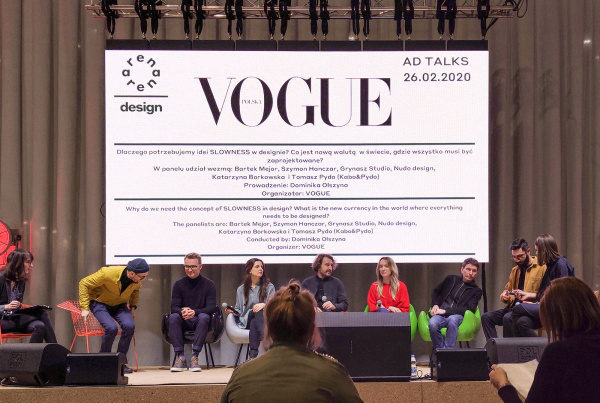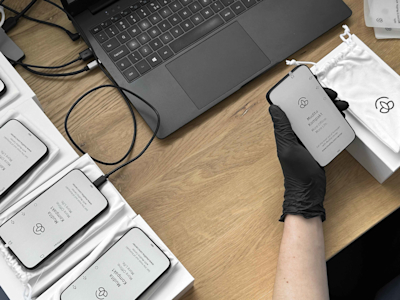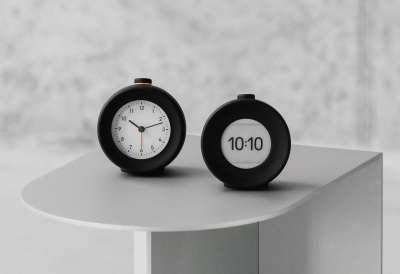
The Concept of Slowness and Mudita
The creators of Arena Design defined slowness as a positive approach for designing and producing products. We’d like to answer the question: is this concept visible at Mudita?
The world is constantly changing, as is industrial design and mass production. We’re currently facing new challenges due to overproduction and overconsumption exploiting our planet.
As industrial designers, we are aware that there are many, many different products on the market. When we take into consideration the above mentioned problems, some might argue that new products might not really be needed.
On the other hand, by designing new products, we do contribute to brands and manufacturers development, which is crucial for the whole economy. As designers, we can sometimes feel as though we’re in a trap, we realize that the ability to change this situation is in our hands.
Slowness, the theme of this year's Arena Design trades edition and a ‘cure’ for today’s design, mass production and fast consumption problems. Arena Design is one of the biggest international events of this kind and it is held in Poznań, Poland.
The trades, exhibitions, seminars and lectures connecting business with design are focused on the most interesting creators and products that contribute to new Polish design, products and materials.
Industrial designers, material designers, material engineers, and producers all met to find out how we could provide better design solutions, more sustainable products and a new approach for production and consumption.
What they proposed was slowing down and what they ensure is that there’s no threat to a global economy. During the exhibitions, lecturers and panel discussions, they tried to define slowness in industrial design and think about how to implement slowness into development strategies. To define how slowness may serve new product development processes.
Slowness is about autoreflection.
There was a time when designers and producers were less conscious when it came to their products, they designed and produced new things using new technologies and materials without as much consideration as they might have now. Those days are gone. In today’s world, every step we take needs to be mindful, preceded by market and user needs research, by autoreflection.
We need to slow down and think for a while, what is our new product going to change, how will it improve a user’s life? There is a real responsibility faced by creators, manufacturers and designers. They do produce things that are going to be bought and used but also thrown away. We need to stay humble and be able to take a step back while developing new products.
Slowness is about having enough time to conduct innovative solutions.
The crucial thing is, slowness requires time, particularly time for proper innovative researching. When a market is full of new products, we need to be sure that ours is going to contribute in a positive way. Time gives us the opportunity to implement innovative and much needed products.
The more time we have, the better research of the market and user’s needs we are able to conduct, the more interviews and tests we can provide. More time lets us design a product better prepared for production and proper utilization. Slowness means more time, and more time in the design process means a more responsible product.
slowness is about conducting innovations - OXY pots by Kabo&Pydo
Slowness is about being mindful about materials and production.
There’s no accidental actions when it comes to the slowness approach and the process of developing a new product. We need to be as respectful for resources and our planet as possible.
Hence, embracing the idea of being mindful about the materials and production technologies that we’re using. Slowness is about knowing your materials well, it’s genesis, properties, requirements, weaknesses.
When designers know their production technique requirements, costs, time and environmental impact, only then are they able to choose wisely, giving the production process and product itself the best performance.
slowness is about knowing your materials well - wooden vases by Maciej Gąsienica Giewont
Slowness is about designing a product that is repairable.
Users are definitely irritated by the fact that they need to spend money on new things because the ones they have already bought are broken and totally useless. We often mention times when parents and grandparents were able to take care of broken appliances independently or by looking for help from a local handyperson.
Recently, the European Commision has ratified a new regulation called ‘right to repair’, that is going to be implemented in 2021 and requires that companies design longer-lasting products. The products should be easily fixed using spare parts easily and be repaired by the companies who manufactured them.
It’s the first positive step towards further changes, yet not enough to make users independent in this case. However in Poland, the level of awareness and attachment to an upcycling or ‘repair and reuse culture’ (which might be connected to our history and a PRL era) allows producers to start offering products that are more repairable. This is a new brief assumption that is happening more and more often.
Slowness is about planning a product post-life cycle.
As we will offer products made more consciously, made of better chosen materials, products that can be repaired both by a producer or a user, we’re still going to offer products that will in some time be exploited.
As designers, we need to think about how a product's life ends before it has even begun. Slowness requires designing all of the interactions the user is having with a product. Including these last, related to throwing away, recycling or sending back to a company.
The challenge is to make the waste management of products as easy as purchasing them. We should try to focus on reprocessing as much as we are focused on packaging, it will definitely make the product attractive as well.
Slowness is about designing experiences rather than just things.
In fact, each designer is a UX or UI designer as well as a product designer. Indeed every designed product has an interface through which it communicates with the user, providing certain, predicted experiences, thoughts and emotions while used.
By focusing on what users are feeling and experiencing we’re getting more mindful about their needs, frustrations and expectations. By concentrating on experiences, we’re more focused on what matters the most and it might lead us to a place where we create as minimal or as humble a form as possible.
A form that in its simplicity, might be attractive from an economic and production point of view. Designers should bear in mind that each product we use in everyday life is providing impressions experienced through all human senses, which is what makes material things both remarkable and memorable.
Slowness is about constant, mutual education between business, marketing and design.
It is already well known that communication between co-workers and teams are essential, internally and externally as well. Design and business have different approaches, but it’s good to understand both of them are contributing to users everyday life.
There’s a lot of positive changes in the way companies, big or small, are a part of their designer's work and education. We should listen to each other and be open to learning new things, be open to new principles and challenges.
Perhaps more importantly, we should agree on a few particular aspects, what matters the most is the wellbeing of your users and the condition of our planet.
How is the concept of slowness visible at Mudita?
As a niche, fresh on the market brand, with a little revolutionary approach associated with mindfulness and wellbeing, we’re really interested in any kind of alternative drivers leading to new environmental, user and business friendly solutions.
As a humane technology company, by providing solutions making users' everyday lives more mindful and slow, we’ve got slowness in our DNA.
We might not be a big company but we’re definitely focused on being conscious while taking relevant steps in developing the brand and new products. Indeed we’re right about to launch the very first product Pure, the minimalist phone, and by working on it we definitely found out a lot about slowness.
We spent a lot of time researching users' needs, defining our target groups and looking for innovation to provide for them. We learned a lot about proper material selection, its restrictions and limitations. We took on the challenge to produce and assemble as many parts of a phone as possible, here in Poland, locally.
The whole process of Pure’s development took a lot of time but we do feel that it was precious and valuable, every step taken supports our approach to designing new mindful products. The knowledge and perspective we gain, enables us to feel proud of our own skills. Slowing down is needed both in developing new products and in a users' everyday life.
Now, by working on a new product we will be able to spread our brand values, such as being offline and present, being mindful, taking care of one’s well being, but we will also be able to bring to life new slowness approaches to make our development strategies more and more smarter and planet friendly.
If you’re interested in learning more about Arena Design 2020, you can visit their website. This article was written by the industrial design team at Mudita.
What do you think of the ideas behind the slowness movement? Is there anything you’d like to add, have we missed anything? We’d love to know what you think. If you’re interested in sharing your experiences with us or writing a guest post for us, send us an email via hello@mudita.com!
Please feel free to get in touch via social media (send us some photos or videos too), you can find us on Facebook, Twitter and Instagram, let’s connect! To learn more about Mudita, take a look at our website and our other posts. If you enjoyed reading this article, please share and recommend it! We need to go online to find people who’d like to spend more time offline.
Related stories

It’s Happening! Mudita Kompakt Has Started Shipping!
It’s happening! Mudita Kompakt has officially started shipping. The first phones are on their way to backers. Get all the exciting details in our latest update.

Mudita Launches Kickstarter Campaign for Bell 2 & Harmony 2
With a focus on precision, design, and user experience, these new alarm clocks are set to revolutionize your mornings and elevate your overall well-being.

Our Digital Lives: The Power of Privacy
Consumers are expecting privacy, and if companies fail to provide adequate safeguards, they will find someone who can.
If you'd like to receive the best stories from our blog, keep up to date with our progress and get notified about our product releases and special discounts.